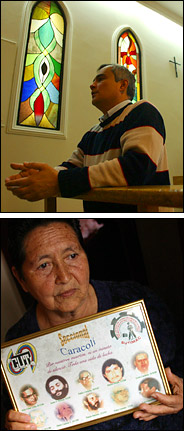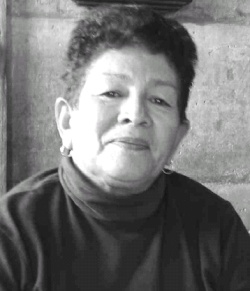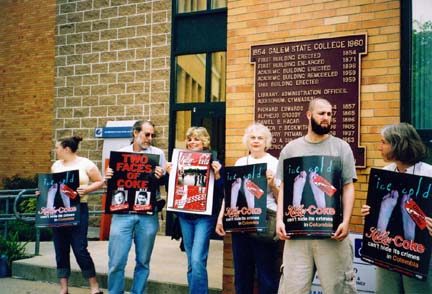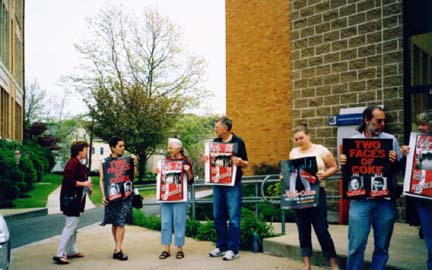Dear friends,
After a long silence, I am sending you an update on the situation of the communities displaced by coal mining in La Guajira, Colombia. I apologise for its length. As soon as the company has responded to concerns which we raised at the recent shareholders' meeting of BHPBilliton, I will send out a short urgent action request asking you to email the company. You will be able to use the current email as background information.
Thanks for your interest.
Richard Solly,
Colombia Solidarity Campaign/Mines and Communities Network
Update on coal mining at El Cerrejon, Colombia, December 2004
Communities around the massive Cerrejon Norte coal strip mine in the northern province of La Guajira, Colombia, are still waiting for justice from the Colombian government and the multinational mining companies who own the mine.
The mine is operated by Carbones del Cerrejon SA, owned by Anglo American, BHP Billiton and Glencore.
Mines and Communities member group Yanama has supported a number of the communities affected by the mine and the Mines and Communities website (www.minesandcommunities.org) has reported on the struggles of two of them: Tabaco and Tamaquitos. London-based Mines and Communities associate Richard Solly visited the area in October 2004 and subsequently attended the annual shareholders' meeting of BHPBilliton plc in London on 25 November. Here he reports on the current situation of these two displaced communities.
Tabaco
The settlement of Tabaco was demolished and its remaining inhabitants evicted by armed force in August 2001; what little remained of the village after that date was finally destroyed in January 2002. This was when Intercor, a 100% owned subsidiary of US multinational ExxonMobil, operated the mine. Intercor, however, only owned 50% of the mine: the other 50% was owned by the same three-company consortium which now fully owns and operates it.
In May 2002 the Colombian Supreme Court ordered the local authority (the municipality of Hatonuevo) to reconstruct a viable settlement for the now displaced community, in a new location acceptable to the people of Tabaco, beginning immediately. This has still not been done. The Alcalde (Mayor) of Hatonuevo claims that it is impossible for the municipality to comply with the court's decision for lack of money. He is adamant that the mining company should finance the reconstruction. The national Procurator's Office insists that the municipality comply with the Supreme Court decision using its own resources; but it does not enforce the decision. A meeting was scheduled at the Alcaldia (municipal offices) in Hatonuevo on 13 October between community representatives, a representative of the national Procurator's Office, and the Mayor. The Mayor, citing `personal business', failed to attend. Meanwhile, the community has found a suitable location for reconstruction of an agricultural settlement at La Cruz, a rural property of 450 hectares whose owner is very happy to sell.
The multinational mining consortium is eager to put the matter of Tabaco behind it because it damages its international image. Both Anglo American and BHPBilliton have repeatedly stated that they were not responsible for the 2001 demolitions, even though their consortium owned 50% of the mine at that time. Carbones del Cerrejon has increased its offer of individual financial compensation to community members still holding out for a community relocation agreement - though not to a level adequate to compensate them for the destruction of their agricultural livelihood and the disruption to community life.
The company has insisted that 95% of Tabaco's original community members opted for individual financial compensation rather than community relocation. It has not, of course, described the intense pressure to which community members were subjected, including being told by representatives of the mine operator that they had better settle quickly or they would get nothing, and this at a time when some of them were already finding it impossible to make a living because of the amount of agricultural land that had been swallowed up by the mine.
The mine's owners are keen to ensure that dissident shareholders visiting Colombia should meet with local mine management. One of the cardinal principles of Mines and Communities is that nobody has the right to represent any mine-affected community without the explicit authorisation of that community; and experience teaches that any meetings with mine management should be in the public domain. So when the President of Carbones del Cerrejon, Alberto Calderon, offered to meet me when I was in Colombia, I consulted with representatives of the Tabaco community. They decided that it may be useful if community representatives could meet Mr Calderon with me there as an international observer.
The meeting took place on 5 October in the Alcaldia de Albania (the Municipal Offices in Albania, one of the towns closest to the mine workings). Mr Calderon did not seem particularly happy to have had to travel from his office in the coastal city of Barranquilla to Albania and community representatives present were certain that had it not been for the presence of an observer from Europe he would not have attended. Mr Calderon himself told me that he was disappointed that I had not taken up his offer of a private meeting and expressed the hope that I might do so in the future, so that I could hear the company's point of view.
Of course, it is quite easy to learn the company's point of view since it is extensively publicised on the company's website and in its publications, as well as in sympathetic coverage in the local and regional press. Mr Calderon was concerned that I may be hearing only one side of the story. He reminded everyone at the 5 October meeting of the company's largesse towards displaced residents of Tabaco, using the example of a community member whom the company had moved to a big city so that her children could receive a better education. This particular example was also being trumpeted in the company's magazine, as proof that the lives of former residents of Tabaco had improved with the company's help. The company had bought her a house and was paying for the children's education. It had also paid for an ophthalmic operation for her daughter.
What neither the magazine nor Mr Calderon mentioned was that the community member in question had resisted relocation until the company's bulldozers destroyed the house that she had built in Tabaco, where I had visited her in 2000, and of which she had been very proud; a simple house, to be sure, but a symbol of independence. There was no mention either of the video of the destruction of Tabaco, in which she is filmed weeping over the ruins of that house. I interviewed her after the 5 October meeting with Mr Calderon and she told me that after the destruction of Tabaco she certainly felt that it would be better to move away and that she was grateful to the company for giving her children the opportunity for a good education - this was extremely important to her. She was also grateful to the company for the help it had given for her daughter's operation. But she admitted that the company gave no other support, not even help with emergency medical care, and that, since she had been unable to find steady work in the city, she was dependent on friends from the displaced community of Tabaco to send her money for food for herself and her children. Without that continued community solidarity, they would go hungry. So perhaps the company's largesse is not quite so large as it wishes people to believe, and perhaps those who want a balanced understanding of the impacts of the company's activities do need to talk directly with those who have been displaced.
At the 5 October Alberto Calderon said that the company had deposited money in the Bank of the Republic to settle the cases of the remaining nine former residents of Tabaco who had not yet come to agreements with the company. He said that the company was willing to listen to their concerns.
The community's legal representatives, Armando Perez, said that he did not agree that the issue was simply about the nine remaining unsettled cases. He explained the history of the case of Tabaco. He spoke of the use of servidumbres: these enable a mining company to gain legal access to private property which it does not own for the purposes of facilitating its mining operations. By law, compensation must be offered, but not at a level equal to the purchase price of the property, since it is only a question of access. In the case of El Cerrejon, these servidumbres had involved the destruction of people's houses and evictions from people's own private property, while compensation had been offered only at a level appropriate for access; in other words, servidumbres had been used as a cheap method of clearing land of its inhabitants.
Jose Julio Perez, President of the community's Relocation Committee (Junta de Reubicacion) spoke about the census which the company had used to determine who was a member of the community for purposes of compensation. Not only did it exclude people who were members of the community but it also included people who had nothing to do with the community. Jose Julio explained that those who carried out the census were in the pay of the company. He explained that a Junta de Accion Comunal had been set up by the company supposedly to represent the community's interests in negotiations with the company. It had been formed from members of the community who were willing to co-operate with the company. Jose Julio had himself been a member of this Junta until he realised that it was simply a creature of the company. He also spoke about the physical attacks on members of the community during the evictions and demolitions of August 2001. Jose Julio said that the community was not against the company and that they wanted to be friends with the company but that company employees had acted badly. Those who had negotiated with the company had done so because they were destitute and hungry.
Alberto Calderon reaffirmed that the company could only consider compensating people who had been `possessors' in the sense meant by the World Bank. People who lived in Tabaco outside this category constituted a problem for the company.
Mr Sarmiento, responsible for land purchase by the company, said that although the company had certainly brought about involuntary displacement, it had not brought about forced displacement as far as Colombian law was concerned. Armando Perez disagreed with this position. Both Colombian and international law included in the meaning of forced displacement the kind of displacement caused by large industrial projects when they were enforced by the authorities.
Alberto Calderon and other company representatives said that the company would be willing to reopen talks with the Junta de Reubicacion both on legal matters and on ways in which the company could help establish small-scale social and economic projects. Community representatives were clear that legal discussions about the righting of a grave injustice should precede talks about company-funded projects, because in their view the company had used the distribution of small amounts of money for such projects as a way of dividing communities and distracting them from the fundamental issue of legal redress. Jose Julio Perez said that any offers of assistance with social and economic projects should be made in writing to the Junta de Reubicacion so that the community could discuss them properly and come to a common mind on them.
Alberto Calderon then said that company lawyer Eduardo Lozano would speak with the community about legal matters. He had not been involved in earlier disputes with the community. They could even look again at the disputed census, even though the list of residents that it contained was of great importance to the company.
The meeting thus ended on a note of cautious hope. It did not last long.
Later in October, a meeting was held between the company's appointed representatives and the Junta de Reubicacion. Progress was made on agreeing a procedure for further discussions. The meeting was to reconvene to discuss what to do if the company and the community could not come to an agreement. But when it did reconvene, company representatives stated that there could be no further discussions for the time being on legal matters, only on the financing of social and economic projects, and that there could be no agreement on what to do in the event of a failure to agree. So it is clear that the company is back to business as usual.
Questioned at the 25 November BHPBilliton shareholders' meeting about the change in policy between 5 October and the follow-up meeting, BHPBilliton Chair Don Argus simply repeated that the company had settled with all but nine former residents of Tabaco and refused any further comment on the matter.
El Cerrejon's multinational owners must be pressured to return to the negotiating table to discuss legal redress for the way they have treated the whole community of Tabaco, and not simply to discuss a few smallscale projects to ameliorate the conditions of the nine property owners who have held out for a better deal for the whole community - especially as the poorest former residents, precisely those whom the company will not accept as legitimate property owners, have never received any compensation at all and are still not being offered any.
The Colombia Government must be pressured to finance the relocation of the community to La Cruz, in fulfilment of the Supreme Court decision of May 2002.
Tamaquitos
Tamaquitos is an Indigenous community consisting of 31 Wayuu families and a few non-Wayuu individuals who have married in. The community owns an area of around 14 hectares. The mining company has in the past claimed that the community is not Indigenous. When this manifestly absurd claim became unsustainable because foreign visitors to the community had noted the Wayuu appearance and language of the inhabitants, the company began claiming that although the community is Indigenous, it has not been in the area long and its member families originate in other nearby Wayuu communities.
However, the whole area around the mine was Indigenous territory, and Wayuu families have been in the area for generations, having migrated from further north in the province of La Guajira. It is ridiculous to suggest that because a particular village has not been in existence for hundreds of years it does not constitute part of the ancestral patrimony of the area's Indigenous inhabitants. Tamaquitos community leaders Enrique Epiayuu and Jose Manuel Epiayuu affirm that Tamaquitos was founded after many struggles by one family. All its inhabitants are related.
The company has until recently claimed that it owns no land adjacent to Tamaquitos. It now admits that it does own land to within a few hundred metres of the settlement, although its mining operations are several kilometres away, over a hill. Community leaders say that despite the distance of the mining operations, fugitive coal dust is a problem at times. They also say that the company owns most of the land close to the community and that as a result opportunities to work on surrounding farms have ceased. The company claims that it has leased land close to the community back to its original owners and that this should enable community members to find work. Community leaders explain that people from Tamaquitos have had to cross the border into nearby Venezuela to find sufficient waged farm work to make any kind of living.
Current road access to Tamaquitos is extremely difficult and may disappear altogether when the closest neighbouring community, Roche, is eventually swallowed up by the mine. In any case, lacking their own transport, community members usually have to rely on the chance passing of vehicles making for Hatonuevo in order to get to the nearest urban centre.
Anglo American and BHPBilliton both claim that Carbones del Cerrejon has no need for the land around Tamaquitos and that there is therefore no need for the community to be relocated. They deny that there is any pressure on the community to leave. But I was told that the fact that the company's land abuts the community means there are problems with private security personnel who have accused people at Tamaquitos of being guerrillas, thus making them potential targets for paramilitary death squads. Allegations were made that there is a surveillance house close to the community, put there by the company. Community members told me that company representatives, including foreigners, are always trying to speak to community leaders, but had so far not found them in, so nobody knows what they intend proposing. Community members have repeatedly told me that representatives of the company have been seeking to buy their land, and some have begun to feel that individual sale may be their only hope.
The community is desperate. Community leaders told me they want the company to talk to them about what the community wants and needs. They need land, work and tools. The community in general wants to be able to continue living as a community. If this is to work, then either the land around the community must be made available again for agricultural work and compensation paid for the disruption of their livelihood, or the community must be relocated to an alternative, adequate site acceptable to the community
Richard Solly,
11 December 2004
richardsolly@gn.apc.org



 Mirian Olivas Jarquín
Mirian Olivas Jarquín
